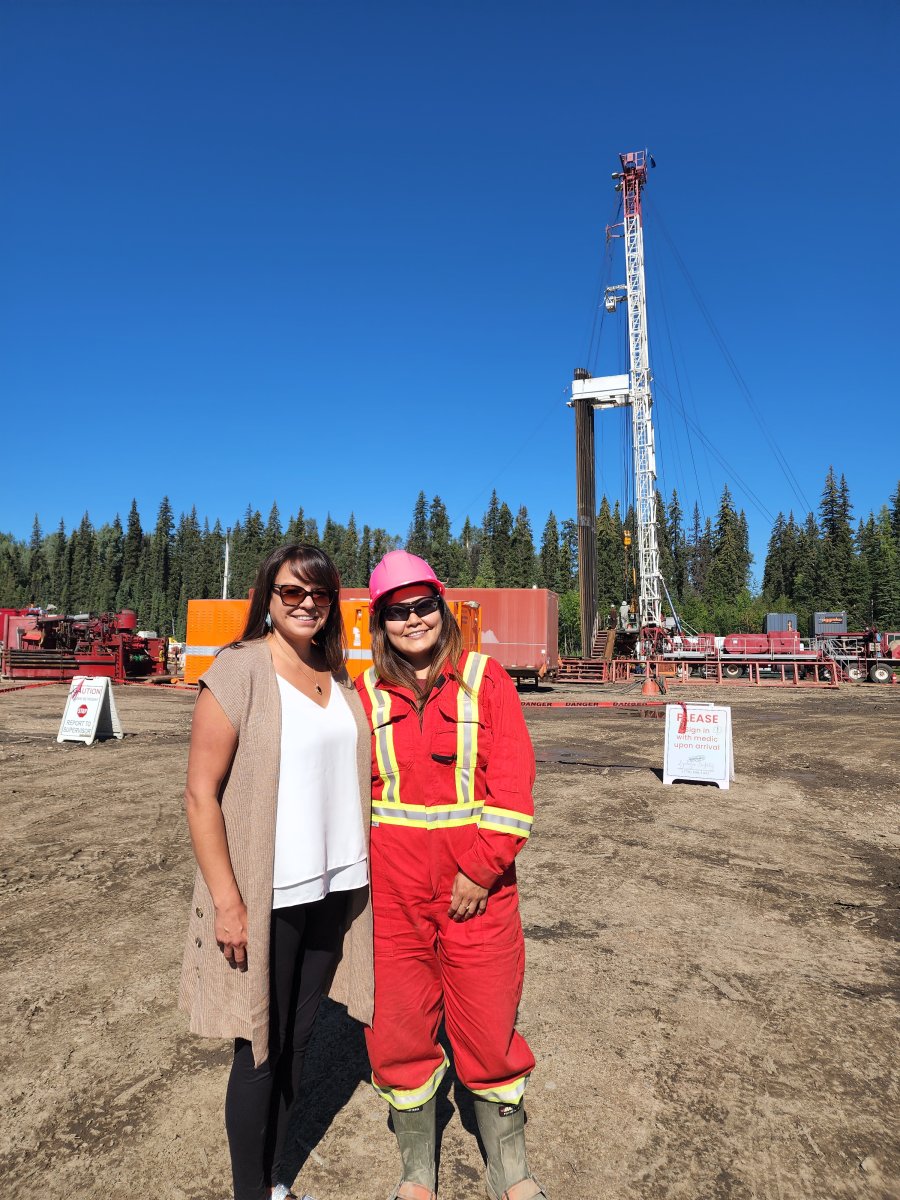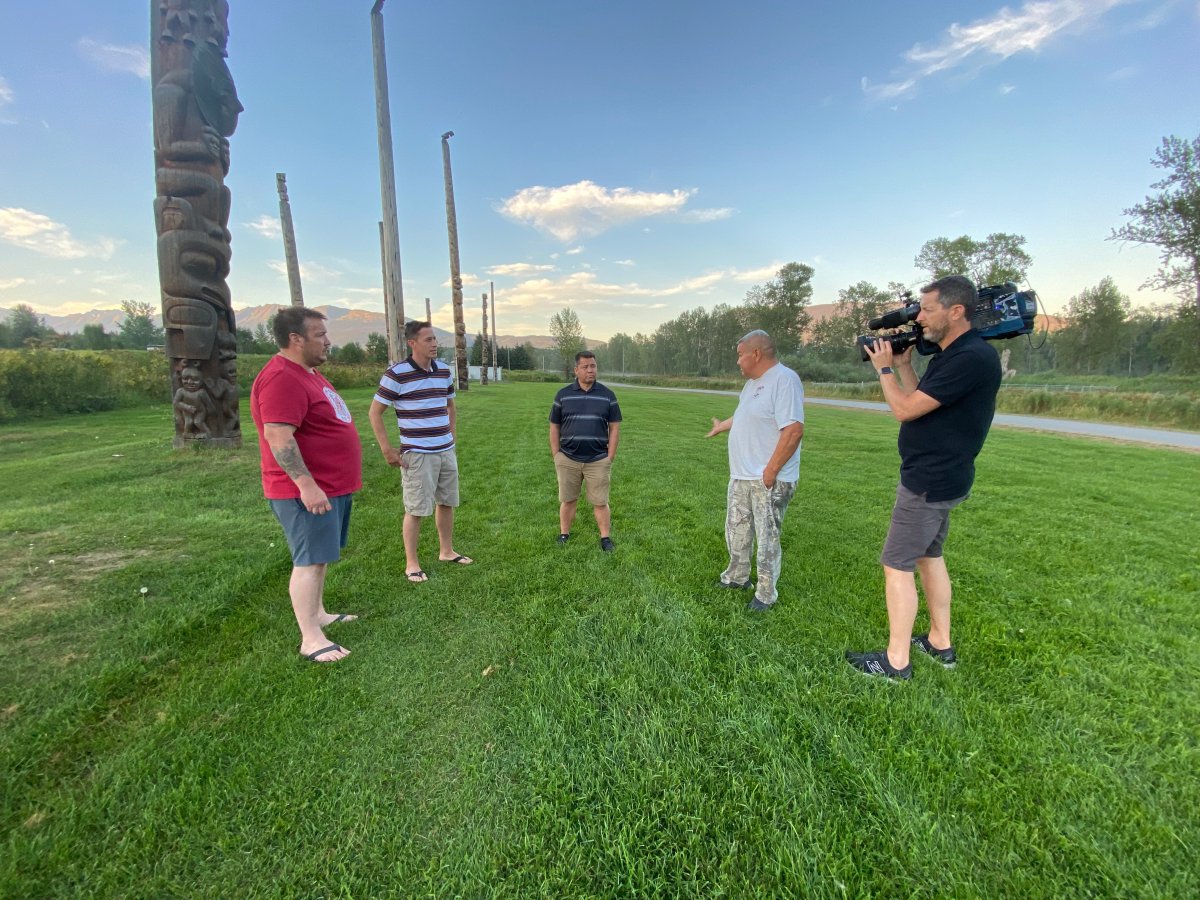By Neetu Garcha
Global News
September 23, 2022

How Indigenous ownership can be part of Canada's energy solution
Canada’s energy dilemma can be dealt with in-part through Indigenous-led clean energy projects, according to some First Nations leaders in B.C. who say they’re too often left out of the conversation.
The path forward, they say, would involve their communities having an equity stake in major projects, while placing this country on the map as a leading exporter of some of the natural resources the world relies on.
“We have so much energy in this country and Indigenous people need to be part of the decision-making process as it relates to resource development. They need to have loan guarantees to buy an equity stake in these projects. Those are key factors that will help Canadians in this country keep oil and gas within the country and export it to other countries,” Wet’suwet’en hereditary chief Theresa Tait-Day told
September 23, 2022

How Indigenous ownership can be part of Canada's energy solution
Canada’s energy dilemma can be dealt with in-part through Indigenous-led clean energy projects, according to some First Nations leaders in B.C. who say they’re too often left out of the conversation.

The path forward, they say, would involve their communities having an equity stake in major projects, while placing this country on the map as a leading exporter of some of the natural resources the world relies on.
“We have so much energy in this country and Indigenous people need to be part of the decision-making process as it relates to resource development. They need to have loan guarantees to buy an equity stake in these projects. Those are key factors that will help Canadians in this country keep oil and gas within the country and export it to other countries,” Wet’suwet’en hereditary chief Theresa Tait-Day told
Tait-Day says with centuries-old ancestral knowledge of protecting lands and natural resources, Indigenous people in Canada can play a major role in helping the world reduce its reliance on fossil fuels.
“It’s important that industry talk to the (First Nation) and understand the nation, understand the history, understand how we’re governed, understand the Indian Act, understand how it’s impacting us,” Tait-Day said.
“And I think that’s a real call-out from me to the government to not just go in blindly, but there’s a whole parameter around engagement and we have failed to figure that out.”
The matriarch from a nation at the centre of Canada’s pipeline fight says many First Nations see energy projects as a way to help their members, in part by generating revenue to help reduce their reliance on government funding – something she says is only possible if it’s done right.
“We’ve never owned a pipeline. We’ve never owned a mine. We have never had an equity stake in this. So the dialog and the conversation hasn’t been at the community level,” she said.
In her own community, blockades and marches in 2019 led by other hereditary chiefs brought construction of the contentious Coastal Gaslink pipeline to a standstill, threatening Canada’s new LNG terminal on the west coast.
READ MORE: First Nations leaders renew call to stop B.C. pipeline projects as UN raps Canada
“It is Indigenous Peoples’ right to self-determination and to be self-determining according to our laws, our traditional governance systems,” Sleydo’ (Molly Wickham), spokesperson for the Gidimt’en Checkpoint said on May 11, 2022.
Many of those opposed to the project say the pipeline doesn’t have consent to cross through their territory but others within the nation disagree, instead signing an agreement with the company along with 19 other nations along the nearly 670-kilometre route. Those nations now have the option of equity ownership of ten per cent of the project.
With Russia’s war in Ukraine shining another light on the danger of our allies’ dependence on foreign energy sources, Tait-Day says governments and industry need to do a better job of setting the stage for meaningful dialogue.
“We have to have global security. We have to have control of our energy projects as Canadians, as Indigenous people, and to play a part in a global market, be the distributors to help our nations, Canadians and Indigenous people across the country to be sustainable. We’ve seen what happens when we rely on Russia,” Tait-Day said.
To help move the process along, she co-founded the First Nations Major Projects Coalition (FNMPC). She says together, they’re supporting 90 Indigenous communities who have ideas about their future and green energy.
“We are able to do the legwork for the nations, find the funding, help deal with the hurdles that we have to go through with the government. Government does not want to engage with us because it’s not in their interest. Their interest is to continue to perpetuate the internalized racism and their internalized oppression of our people by making decisions for us,” Tait-Day said.
READ MORE: Indigenous communities ink Coastal GasLink option deals with TC Energy
Among the communities working with the FNMPC is Fort Nelson First Nation in northeastern B.C. Chief Sharleen Gale, also chair of the FNMPC board, says her community’s first-in-Canada $100-million geothermal project could heat up to 14,000 homes and eventually sell energy to the province’s power grid.
“This is 100 per cent Indigenous-owned,” Gale told Global News.
Gale says the project is inspiring remote communities across the country who historically haven’t seen themselves as major players in this market, adding, it’s critical they’re involved in the planning of resource projects from the beginning.

Fort Nelson First Nation Chief Sharlene Gale at geothermal project site. Supplied
“We are the keepers of the land, we’ve lived here for thousands of years, we know where things can and cannot go … companies whether they go bankrupt or whatever, they leave our territory and then as Indigenous people we are left to clean up the mess and I think if we’re involved at the forefront, we could ensure best practices on the ground to really reduce the impacts,” she said.
STORY CONTINUES BELOW ADVERTISEMENT
She believes Canada’s energy transition needs to find a balance between economic prosperity and environmental stewardship.
Tait-Day says it’s also important to address those who may believe signing agreements with industry partners means giving up inherent rights and title to their land.
“Actually that’s not the case. The case is they’re renting the land,” Tait-Day said.

“We are the keepers of the land, we’ve lived here for thousands of years, we know where things can and cannot go … companies whether they go bankrupt or whatever, they leave our territory and then as Indigenous people we are left to clean up the mess and I think if we’re involved at the forefront, we could ensure best practices on the ground to really reduce the impacts,” she said.
STORY CONTINUES BELOW ADVERTISEMENT
She believes Canada’s energy transition needs to find a balance between economic prosperity and environmental stewardship.
Tait-Day says it’s also important to address those who may believe signing agreements with industry partners means giving up inherent rights and title to their land.
“Actually that’s not the case. The case is they’re renting the land,” Tait-Day said.

Alberta energy industry undergoing green transition –
That’s where the ground-breaking Delgamuukw v. British Columbia case is paramount. A landmark decision that started in the small community of Kispiox. Earl Muldoe was a claimant in that historic lawsuit, which in 1997 recognized Wet’suwet’en has a system of laws and ownership of the land that predates colonialism.
Muldoe died in January. Now, his nephew Jordan Muldoe, an elected Kispiox councillor, says the case continues to loom large in his life.
“The Delgamuukw decision is huge … consultation is what they were trying to achieve, but it starts years ahead of time,” he said.
Kispiox councillor Stu Barnes says having equity stakes in major resource projects could also help communities like theirs remove reliance on Indigenous Services Canada (ISC).
“The goal is to become self-sustainable and not have to rely on the formulas that ISC imposed on us and have limited our ability to live off the land and at the same time created dependence on the Indian Act,” Barnes said.

That’s where the ground-breaking Delgamuukw v. British Columbia case is paramount. A landmark decision that started in the small community of Kispiox. Earl Muldoe was a claimant in that historic lawsuit, which in 1997 recognized Wet’suwet’en has a system of laws and ownership of the land that predates colonialism.
Muldoe died in January. Now, his nephew Jordan Muldoe, an elected Kispiox councillor, says the case continues to loom large in his life.
“The Delgamuukw decision is huge … consultation is what they were trying to achieve, but it starts years ahead of time,” he said.
Kispiox councillor Stu Barnes says having equity stakes in major resource projects could also help communities like theirs remove reliance on Indigenous Services Canada (ISC).
“The goal is to become self-sustainable and not have to rely on the formulas that ISC imposed on us and have limited our ability to live off the land and at the same time created dependence on the Indian Act,” Barnes said.

Kixpiox band councillors speaking to Global News about Canadas energy crisis. Global News
A major challenge preventing this participation is a lack of funds to invest in the projects, according to Kispiox Chief Councillor Cameron Stevens.
“I think it would be good to be partners of this clean energy movement and I think we have, you know, a lot of resources on our territory that can be used for clean energy, whether it’s the run of the river or geothermal and even biomass,” Stevens said.
“But most of the time, it’s it’s money. That is one of the hurdles from moving the project forward, at least in our area.”
Regardless of the path, Tait-Day says the partnerships are key because Canada can’t deal with its energy dilemma without the support of Indigenous people whose land, in many cases, remains unceded.
A major challenge preventing this participation is a lack of funds to invest in the projects, according to Kispiox Chief Councillor Cameron Stevens.
“I think it would be good to be partners of this clean energy movement and I think we have, you know, a lot of resources on our territory that can be used for clean energy, whether it’s the run of the river or geothermal and even biomass,” Stevens said.
“But most of the time, it’s it’s money. That is one of the hurdles from moving the project forward, at least in our area.”
Regardless of the path, Tait-Day says the partnerships are key because Canada can’t deal with its energy dilemma without the support of Indigenous people whose land, in many cases, remains unceded.
No comments:
Post a Comment